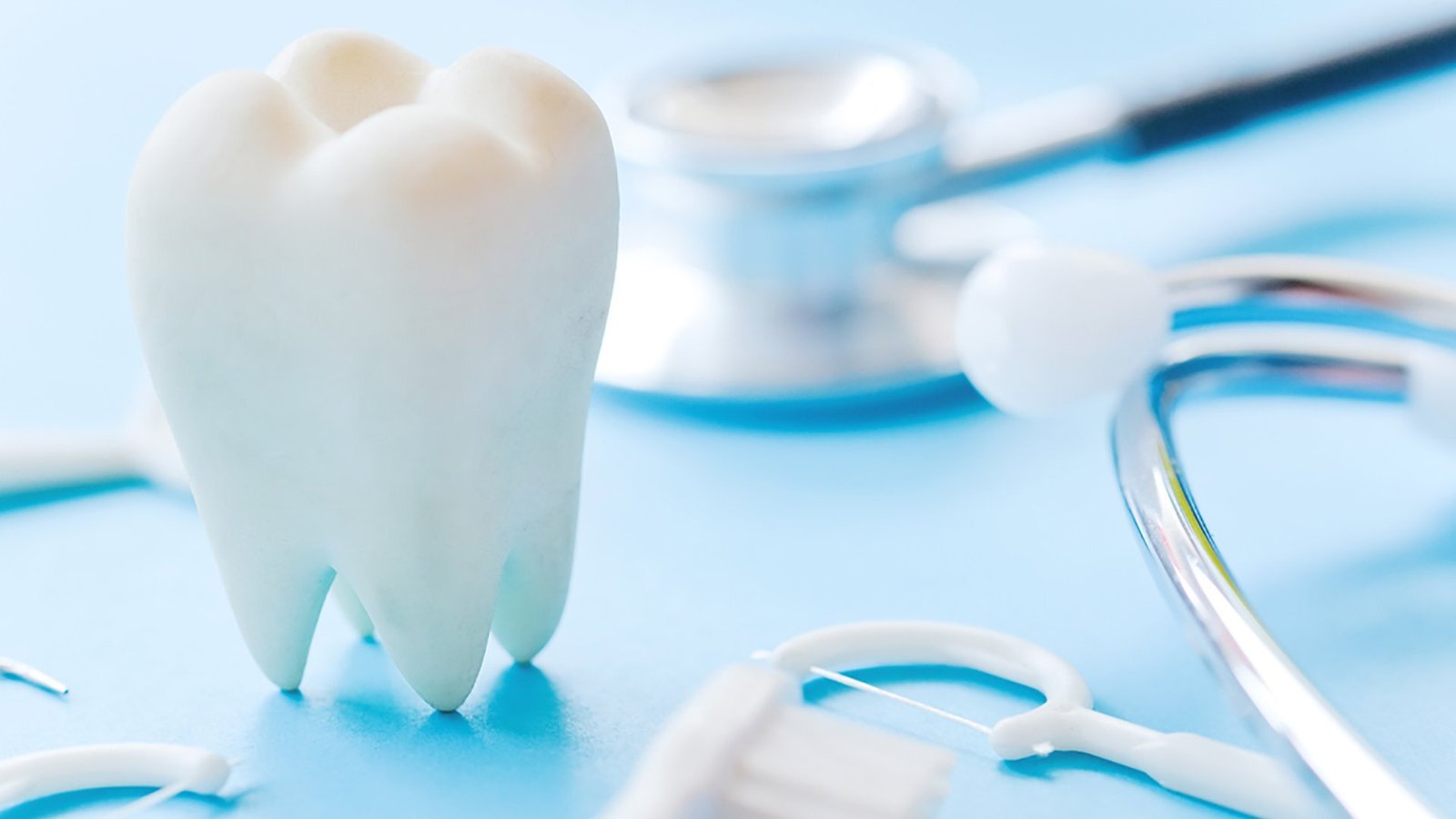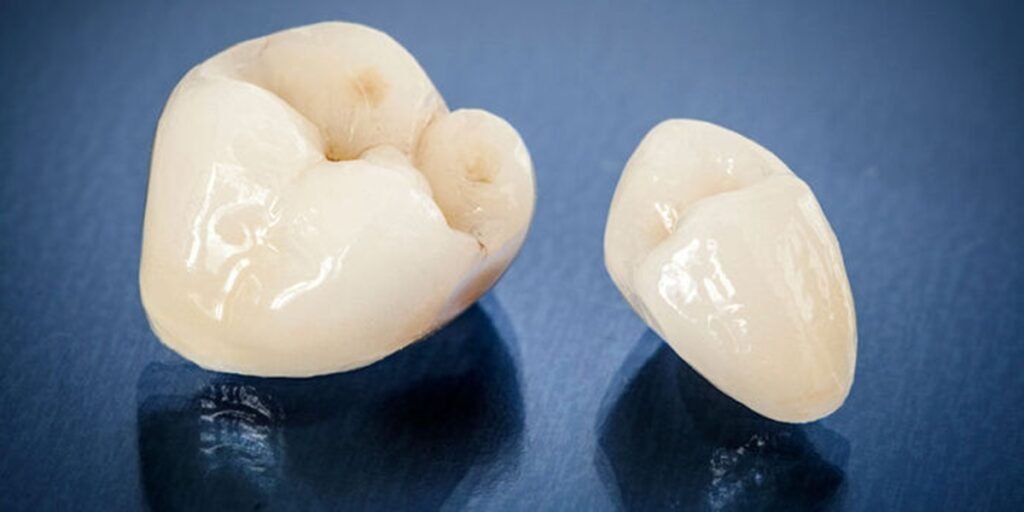
Dental crowns are among the most versatile solutions in restorative dentistry, offering both functional and aesthetic benefits. Whether you have a cracked tooth, severe decay, or simply want to enhance your smile, understanding what a dental crown is, the types available, and the costs involved is critical.
This guide answers all your questions, from the procedure to how long crowns last, helping you make an informed decision.
What Is a Dental Crown?
A dental crown is a custom-made “cap” that covers a damaged or weakened tooth to restore its shape, strength, and appearance. Crowns protect teeth from further damage, improve alignment, and support dental bridges. They’re commonly used after root canals, for large fillings, or to cover discolored or misshapen teeth.
Types of Dental Crowns

Dental crowns restore damaged, decayed, or weWhite Dental Crownsakened teeth while improving functionality and aesthetics. The right crown for you depends on durability, aesthetics, budget, and personal preference.
1. Porcelain-Fused-to-Metal (PFM) Crowns
PFM crowns combine a strong metal base with a porcelain outer layer, offering durability and a natural look.
Pros:
- Strong and long-lasting, suitable for front and back teeth
- Natural appearance due to porcelain coating
- More affordable than all-ceramic options
Cons:
- A dark gum line may appear over time due to the metal base
- Prone to chipping or wear over time
- Cost: $800–$1,500 per crown
2. All-Ceramic / All-Porcelain Crowns
These crowns are made entirely of ceramic, providing the best aesthetics without any metal.
Pros:
- Highly aesthetic, ideal for front teeth
- Metal-free, making it biocompatible and suitable for people with metal allergies
- Matches natural tooth color more accurately
Cons:
- Less durable than PFM or zirconia crowns
- Can be prone to fractures under heavy chewing forces
- Cost: $1,000–$2,500 per crown
3. Zirconia Dental Crowns
These crowns are made from high-strength zirconia and provide exceptional durability and a natural appearance.
Pros:
- Extremely durable, resistant to cracks and chips
- It offers a more natural look than metal-based crowns
- Metal-free, making it ideal for patients with metal sensitivities
Cons:
- Less translucent than porcelain, though new multi-layered zirconia improves aesthetics
- Higher cost compared to PFM crowns
- Cost: $1,200–$2,500 per crown
4. Metal Crowns (Gold & Alloys)
These crowns are made from gold, palladium, or nickel-based alloys and offer maximum strength and longevity.
Pros:
- Longest-lasting, ideal for back teeth
- Requires minimal tooth removal
- Resistant to wear and fractures
Cons:
- Highly visible, making it unsuitable for front teeth
- It is more expensive, especially for gold crowns
- Cost: $800–$2,000 per crown
5. Composite Resin Crowns
These crowns are made from tooth-colored resin, providing a more affordable solution for dental restoration.
Pros:
- Budget-friendly, ideal for temporary or short-term fixes
- Matches natural tooth color
- Quick and easy application
Cons:
- Less durable, prone to staining, chipping, and wear
- Typically lasts only 5–7 years compared to longer-lasting alternatives
- Cost: $400–$1,200 per crown
Aidite’s Pediatric Zirconia Crowns:
Aidite offers a range of zirconia materials designed for various dental applications, including pediatric dentistry. While specific products labeled exclusively for pediatric use are not detailed in the available sources, Aidite zirconia materials can fabricate pediatric crowns due to their biocompatibility, strength, and aesthetic properties.
Aidite’s Zirconia Materials Suitable for Pediatric Crowns:
3D Pro Zir:

- Biocompatibility: Made from 100% TOSOH yttria-stabilized nano-zirconia powder, ensuring patient safety, including children.
- Strength: Flexural strength of up to 1100 MPa, providing the durability necessary for pediatric applications.
- Aesthetics: Layerless, natural shade gradient mimics the appearance of natural teeth, which is beneficial for anterior restorations.
- Translucency: Optimized translucency transitioning from cervical to incisal areas, enhancing the natural look.
- Indications: Suitable for various restorations, including single crowns and bridges, applicable to pediatric cases.
HonorZir :

- Biocompatibility: Combines advanced technologies to ensure safety and compatibility with oral tissues.
- Strength: Flexural strength of 1250 MPa, offering high durability.
- Aesthetics: Super high translucency (48%) provides a natural and realistic appearance, ideal for visible teeth.
- Indications: Recommended for various restorations, including anterior and posterior crowns, suitable for pediatric dentistry.
Why Choose Zirconia Crowns?
Aesthetic Appeal
Zirconia crowns closely resemble natural teeth in color and translucency, providing a seamless and attractive look. This is particularly beneficial for front teeth, where appearance significantly impacts a child’s smile and self-esteem.
The smooth surface of zirconia crowns resists staining from foods and beverages, helping maintain their pristine appearance over time.
Durability and Strength
Made from zirconium dioxide, these crowns are exceptionally strong and can withstand the biting and chewing forces typical in children. This durability reduces the likelihood of chipping or breaking, ensuring a long-lasting restoration.
Due to their strength, zirconia crowns often require fewer replacements than traditional crowns, promoting better long-term oral health for children.
Biocompatibility
Zirconia is a biocompatible material, meaning it is well-tolerated by the body and does not cause adverse reactions. This makes it a safe choice for children, minimizing the risk of allergic responses or irritation.
Psychological Comfort
Children may feel self-conscious about metal crowns, especially on visible front teeth. The natural look of zirconia crowns can enhance a child’s confidence and willingness to smile.
Ease of Placement
Many zirconia crowns come in pre-formed sizes, simplifying the selection process for dentists and reducing chair time for young patients. This is particularly advantageous for anxious children, making the procedure quicker and more comfortable.
FAQs
Q: Are dental crowns safe for children?
Yes, dental crowns are considered safe for children. Zirconia crowns, in particular, are biocompatible and free from metals and allergens, making them an excellent choice for pediatric patients.
Q: Will the procedure hurt?
Local anesthesia is used during the procedure to ensure that the child experiences no pain. For children who are particularly anxious or have difficulty sitting still, sedation options may be available to provide additional comfort.
Q: How long do pediatric crowns last?
Pediatric crowns are designed to last until the primary tooth naturally falls out, which can take 2 to 10 years, depending on the child’s age and the specific tooth. Zirconia crowns are durable and can withstand chewing forces, ensuring they remain intact throughout this period.
Q: Can crowns be placed in one visit?
Yes, most zirconia crowns can be placed in a single appointment. The pre-formed nature of these crowns allows for immediate placement after tooth preparation, making the process efficient and convenient.
Conclusion
Dental crowns protect primary teeth from decay, trauma, or developmental issues. While stainless steel crowns remain a reliable option, Aidite’s pediatric zirconia crowns offer a superior blend of aesthetics, comfort, and durability, making them an excellent choice for front and back teeth.
If your dentist recommends a crown, discuss whether zirconia is the right fit. With solutions like Aidite’s innovative crowns, you can ensure your smile stays healthy, functional, and confident.




